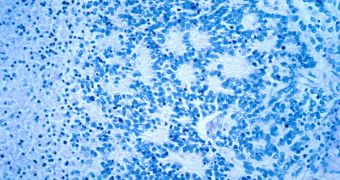Neuroblastoma, a form of cancer that manifests mostly in infants, affects about 600 newborns in the United States every year. Doctors suspected that a few specific genes were responsible for the development of the disease, but until now they had no solid leads to follow in their research. An international team managed to finally uncover the gene behind neuroblastoma and announced that, if their research succeeded, a new cure could be underway soon.
The most dangerous thing about this disease is that it usually takes a long time to identify it in infants and, even then, in 40 percent of cases, it's already too late. This type of cancer accounts for more than 15 percent of the total cancer-related deaths in children, alongside leukemia. Once it moves away from the head, it creates tumors on the abdomen, chest and lungs, leading to death in most such cases. The National Institutes of Health (NIH) say that the only available treatments thus far involved invasive surgeries and chemotherapies, which very few children under 18 months can withstand.
Researchers working on identifying a possible cure for neuroblastome discovered that a gene known as ALK is largely responsible for the development of this disease. The science team used a micro-protein as an inhibitor for the gene, so as to try and prevent all possible abnormalities or mutations that could lead to the onset of the affliction. The technique is very similar to the one used in the development of many new drugs. Once the cause is identified in various genes, inhibitors are created to suppress the action of that gene.
The creation of a new drug aimed at eliminating the risks of children developing neuroblastoma could mean that, someday, infants could receive this vaccine as they now get shots for polio or other such diseases. "We will use what we have learned about the sensitivity of ALK mutations to an ALK inhibitor and attempt to translate this knowledge to the development of targeted therapy for treatment of neuroblastoma patients in the clinic," concluded Wendy B. London, Ph.D, professor at the at the UF College of Medicine.

 14 DAY TRIAL //
14 DAY TRIAL //